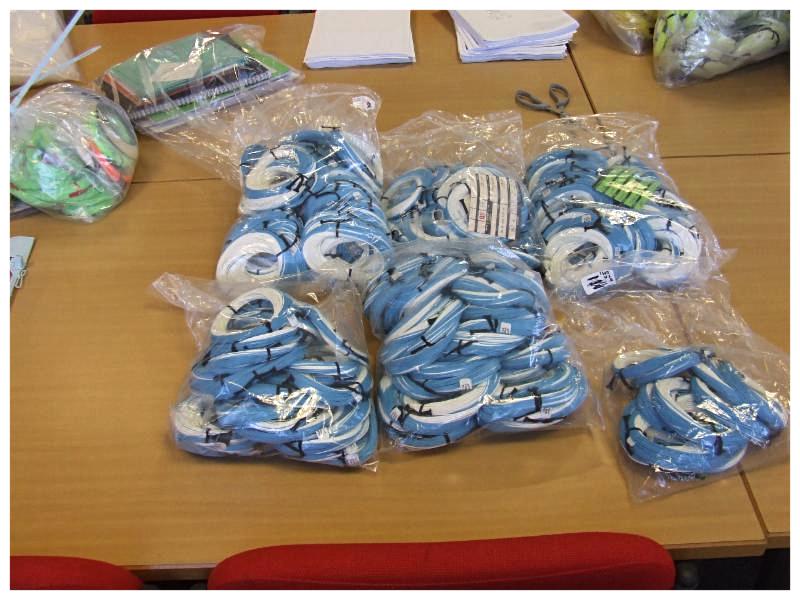It's a fake!
You buy
a new line. The reviews in the angling press were outstanding. You think it
is the answer to your casting woes. With great anticipation you re-spool
your favourite reel. But, however hard you try, your casting goes
backwards. After a couple of hopeless trips you consign said line to the
bin, curse your choice (not to mention the reviewer) before reverting to
the old faithful. Harmony restored.
 Now it would have never
occurred to me that my new line was a fake. We all know the counterfeiters
have a field day with luxury goods. But fly lines? Who would bother? Now it would have never
occurred to me that my new line was a fake. We all know the counterfeiters
have a field day with luxury goods. But fly lines? Who would bother?
Well, apparently Ian
Bailey and Richard Tramer with the former now in prison for eight months
and latter with the seven months suspended.
It seem that this pair,
based in the West Midlands, were selling fake lines under the brand names
we all know well: Rio, Snowbee, Greys, Hardy and Loop. And it was more than
just a market stall operation. Through eBay accounts Telewatcher, The Line
Man and Hardyclassics Bailey had turnover in excess of £150,000. When the
police raided his home near Chester they confiscated more than 5,000 lines.
All credit has to go to
Chris Hartley of Guide Flyfishing who first alerted North Yorkshire Trading
Standards and Russell Weston of Snowbee who gave evidence at the
Scarborough Magistrates'' Court hearing outlining the damage to the brand
reputation when the fake line did not perform as it should.
Three
books for Christmas
This
has been a good year for books; you are spoilt for choice when it comes to
buying this Christmas. I've picked out three to hopefully point you in the
right direction.
The Lost
Words
Robert Macfarlane and
Jackie Morris have created more of a work of art than a book. Amazing
writing. Beautiful drawings. Every page a visual delight that charts the
words that are vanishing from the language of children. Hamish Hamilton
£20.
The Fly
Fisher
People often ask me what
is the best reference book for fly fishing; until now I have always said
(and will continue to say) Charles Jardine's Classic Guide to Fly-fishing for Trout.
However, as it is long out of print having been published way back in 1991
virgin copies are often hard to find though I see a few on Amazon as of
today. But The Fly Fisher:
The Essence and Essentials of Fly Fishing comes very close if
written with the US market and a broader readership in mind. Gestalten £40.
 Silver
Shoals Silver
Shoals
With the sub-title The
five fish that made Britain, this is written by my friend Charles
Rangeley-Wilson. I am too hopelessly biased to offer an objective review (I
loved it) so here is Mark Cocker's choice from The Spectator Books of the
Year.
"It has been a
fishy year for me and Charles Rangeley-Wilson's terrific Silver Shoals: Five Fish That Made
Britain is among its highlights. The author manages to lay bare
this country's abuse of its astonishing former fish abundance, but without
name-calling or losing his sense of simple wonder at fish as vital, vibrantly
wild inhabitants of our encircling seas and waters."
Just so you know the
fish are carp, cod, eels, salmon and herring. Chatto £18.99
Beavers
cause a stir
I
really didn't know that my piece on beavers in the last Newsletter would
create quite such a stir - I have never had such a bulging postbag. It
seems beavers excite passions both sides of the aisle, though I'd say the
consensus was five to one against introduction.
|
|
|
|
|
Beaver
dam on River Otter
|
I am not going to recite
all the arguments again but I thought you might enjoy a taste of the
comments that were made that very much illustrate the spectrum of opinion.
"As you say, the
environment has gone from when these animals used to live. The people that
want to release them, often do not and could not own the land that they
want to release them in. Beavers, wolves, lynx and like have no place in
this country any more. I have asked some of the rewilders how compensation
would be paid to landowners for damage caused by the aforementioned
animals. No answer."
"Do not fuss about
Essex! - they are here (Wiltshire), or at least throughout last year a pair
have been resident on the lake at Orchardleigh, 3 miles from Frome and a
very short distance from the headwaters of the Wylye. Nobody knows their
origin but one can only assume that they have come from the established
introductions in the West Country. The Wilts Fishery Association keepers
went down last spring to hear about the implications of the West Country
introductions on the Otter. No surprises, but we can be pretty confident
that they will be with us on the chalk streams before very long. Bank
damage is probably more worrying than tree damage - any Tay ghillie will
confirm that."
"I am told by a
reliable chum that there are two types of European beaver available on the
"restocking" market - one is a placid number, the other a grumpy
type. Apparently, cos no one else wants them, the latter are coming here. I
also hear that the Tay population is now thought to exceed 600, despite
hundreds per annum being killed by farmers etc. My man painted a very
comical tale of ghillies furiously taking dams down, only to return the
next day to find a bigger, stronger one in place, built by the grumpy
ones."
"How do the people
responsible for these regulations get things so wrong so often? The words
silk purse and a*******e spring to mind. Earlier this year whilst strolling
the banks of the river Otter I came across an old local walking his dog. He
told me that since the introduction of beavers to this small watercourse
(they've had Otters present for years) he has been berated on several
occasions for having the audacity to walk his dog there because ' it
disturbs the beavers '!"
"For the first time
as a keen reader of your newsletters, I find myself in strong disagreement
with your view - in this instance on beavers. The European beaver was once
an indigenous member of Britain's fauna, as indeed were wolves, bears, lynx
and wild boar. It would be difficult to find suitable space for all of
these species to be reintroduced, but in the case of beavers there are
profound potential benefits in terms of significantly increasing
biodiversity and reducing the likelihood of rivers flooding. I understand
that as a riparian owner and someone who makes a living from the desire
that many of us have to enjoy fishing our lovely rivers, you will have
reservations about the ecological changes that beavers will bring."
I always try to keep an
open mind on these things so I will report further when I take up the kind
invitation from the River Otter Fisheries Association to see what is
happening first hand.
A
correction
If you
are reading this whilst serving time at Her Majesty's pleasure having been
marched off a beach clutching an undersized sea bass I do apologise. I am
entirely to blame.
In the last Newsletter I
wrote: So now a catch limit of one fish (under 42cm) per angler per day
is in force until the end of the year. That should of course read OVER
42cm. My sincere apologies for the error and thank you to all of you who
took the time to write in.
The
Quiz
 Apologies
for the lack of a quiz last time; too exhausted by chasing beavers! Apologies
for the lack of a quiz last time; too exhausted by chasing beavers!
As ever three questions
to test your brilliance, or lack of. Answers at the bottom of the page.
1) Who
invented the printing press?
2) Helene
Hanff's book featured what number on
Charing Cross Road?
3) Where is
the oldest bookstore in the world?
Enjoy the weekend.
Best wishes,
Founder & Managing Director
1)
Johannes Gutenberg in the 15th century
2) 84
3) The
Bertrand Chiado bookshop in Portugal opened in 1732.
|
No comments:
Post a Comment